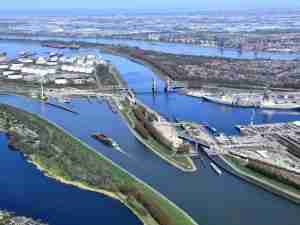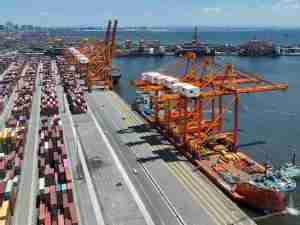Thanks to a public/private partnership, the Philadelphia Regional Port Authority (PRPA), the Philadelphia Regional Produce Market, and Essington Avenue Partners II, a development affiliate of O’Neill Properties, announced that the Produce Market would relocate to Essington Avenue in Philadelphia. This relocation will retain 1,468 current jobs, create 375 new jobs, and enable the expansion and strategic growth plans of the Produce Market.
“This private public partnership will preserve the Produce Market right where it belongs – in Philadelphia,” says Pennsylvania Governor Edward G. Rendell. “Without room for expansion and new, modern facilities, the Commonwealth risked losing this vital operation, and the vendors faced that sad reality that they would be forced to break up a South Philadelphia landmark. Instead, through the concerted efforts of the City, Senator Fumo’s office, the PRPA, Philadelphia Industrial Development Corporation, and many individuals, the Produce Market will be able to grow and thrive while adding 375 new high-paying jobs for working families and millions of dollars to the local and state economies.”
The total development cost of the project is $218.5 million. The Commonwealth is releasing $152.5 million to the Philadelphia Regional Port Authority to support the project, development, and relocation. The Philadelphia Regional Port Authority will purchase 63 acres, build a 667,000 square foot state-or-the-art distribution facility, and will sign a 40-year lease enabling the relocation. The Market vendors will repay 100% of the grants and loans over the life of the 40-year lease.
Without the agreement Philadelphia and Pennsylvania were at risk of losing what is considered an historic and economic regional staple. Several years ago, the Produce Market and the State of New Jersey were in advanced discussions to relocate the Market. This transaction ensures that the Produce Market will stay in Philadelphia for the foreseeable future.
According to analysis conducted by EConsult, it is estimated that the direct and indirect economic benefit to the region and tax revenues to the City of Philadelphia and the Commonwealth will exceed more than $10.8 billion over the life of the 40-year lease. “The new Produce Market will provide tremendous benefit to the local and state economies, as well as continuing to be a major hub for fresh produce imported and exported through the Port of Philadelphia,” said John H. Estey, Chairman of the Philadelphia Regional Port Authority.
James T. McDermott Jr., Executive Director of the Philadelphia Regional Port Authority, said: “The PRPA is extremely pleased to be a major partner in this exciting economic development project. Retaining this important regional asset is a great accomplishment. We look forward to a productive and rewarding relationship with the Philadelphia Regional Produce Market.”
The Produce Market has deep roots and historic significance for Philadelphia. Produce trading goes back to the 1600s on Dock Street at the famed Head House Square. By the early 1800s, the produce industry had carved out an area that wholesalers and farmers would go to, exclusively, on Dock Street. It was a perfect area of the city to buy and trade all types of product due to the close proximity of the port and the newly extended rail lines. Paul Giordano of Giordano Produce, Jimmy Storey of Quaker City Produce, and John Vena of John Vena Produce all have businesses at the Produce Market that extend more than four generations back with grandfather’s starting the family business down on Dock Street in the late 1800s and early 1900s. “Many of the businesses at the market are small family-owned businesses that have been in continuous operation for several generations.
My family’s business was started by my grandfat










